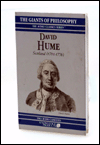

 |

|

The average rating for David Hume, Vol. 2 - Giants of Philosophy - Audio - 2 Cassettes based on 2 reviews is 3.5 stars.
Review # 1 was written on 2019-05-24 00:00:00 Shawn Oconnor Shawn OconnorAs with others in this “The Giants of Philosophy” Audio Classic Series, this nutshell presentation on Hume was excellent. Hume’s thoughts are contrasted with the long philosophical tradition of theoretical reason, which sought truth from an external, objective realm to direct human behavior. This starts with Plato. His quest for the Good later morphed, for others, into the truths of God, and then into the secularized rationalism of the Enlightenment where good and bad became discoverable by reason alone. Hume was critical of this philosophical approach. We are, he argued, primarily beings of passion, not of theoretical reason, and practical reason exists to serve the passions. Hume is also critical of the empiricism of Hobbes and Locke, even though they were also critical of theoretical reason. For those two thinkers, philosophy reflected the mechanical world of Newton. Humans were individualized units, “atoms” in motion, driven by the self-preservation impulse, and they bumped into each other as a result. The only thing that kept order was fear and authority (Hobbes) or counter-vailing power (Locke). While Hume believed in checks and balances and that “liberty must be protected by government and the rule of law,” Hume thought Hobbes and Locke went too far. It was too raw and stark. It was also unnecessary he thought, for we are social beings by nature and naturally inclined via sympathy to act in ways that benefit others. This “capacity for humanity” is the essence of Hume’s moral and ethical theory. Our passions include our social nature. There is no gap between what is and what ought to be. Who we are is good, and that’s who we ought to be. Hume is on solid grounds until he reaches his premise that we are all endowed with benevolent impulses. Many are. Many are not. Darwinian evolution is about variability within the species. We are a species only in a generic, overall sense, but underneath, we are highly variable and there is no single human nature. At one pole are those who promote self-interest regardless of others. When combined with the use of power and manipulation and deceit, this approach works as a survival strategy. Since self-restraint does not happen, external authority is necessary to preserve order, just as Hobbes argued. Some – maybe most – are less extreme and promote their self-interest by cooperating with others for mutual benefit. Here, implicit social contracts are at work to facilitate “reciprocal altruism,” a highly referenced but badly named (there’s nothing altruistic about it) term in evolutionary biology. When combined with institutional checks and balances, this is more in line with Locke’s theory. This also works for evolutionary success. Cooperating for mutual benefit is the essence of group cohesion and it makes for good tribalism. As part of the group, individuals survive. Outside the group, they died. At the other end of the spectrum are those with “fully-evolved” benevolent impulses. They serve others as well as themselves, but not for overt utilitarian purposes. Here the sympathy of Hume does work its magic. Sympathy is the glue that makes the group – family, clan, tribe, nation – cohere. And this too has obvious survival value. The philosophical naturalism of Hume runs into problems when it focuses on a single human nature. We are highly variable beings, including the ways we promote our self-interest. Interestingly, post-Darwinian evolutionary theorists still see human nature in a unitary way. We are all either self-seekers (Spencer, Dawkins) or we are all love-making Bonobos (deWaal et al). But variability is the stuff that natural selection works on and we should be thinking less in generic species terms and more in terms of the inherent variability within our species that allows for the full spectrum between Hobbes and Hume. We have people on both ends but we are mostly a mixture between the two. |
Review # 2 was written on 2019-12-15 00:00:00 George Harris George HarrisThis is an approximately two-hour journey into the life and time and writings of 18th Century Scottish philosopher David Hume. It's very well narrated by Charlton Heston with comments by other thinkers of the time voiced by actors (or perhaps Heston himself) appropriately so that continental thinkers have German or French accents, and thinkers from England sound English as opposed to the direct quotes from Hume, which are voiced in a Scottish accent. The recounting of Hume's life story was vivid and puts his subsequent work and thoughts into perspective. Although he wasn't conventionally religious he had dedicated his life to learning and writing, eschewing "contemptible" distraction and leading a personally austere life. Life in Scotland could not have been easy in that era, and frugality must have increased chances of survival. Hume came up with a number of ideas - such as on what is possible to know, what God may represent (he rejected the personified notion of God, although he did attend church every Sunday), his idea that every person has some sort of empathy for others' plight and that this is the source of morality, and many thoughts on political economy as well. I'm not sure it is possible to instantly absorb Hume's ideas by listening to the very interesting narrative, but the audiobook could be an entertaining introduction to what some might see as a rather dry topic. Anyone interested could continue to look into Hume by actually reading some of his works or taking a class on Hume (along with the other 18th C philosophers). This is an excellently produced introduction however - and I would recommend it to anyone interested in finding out about this important philosopher. |
CAN'T FIND WHAT YOU'RE LOOKING FOR? CLICK HERE!!!